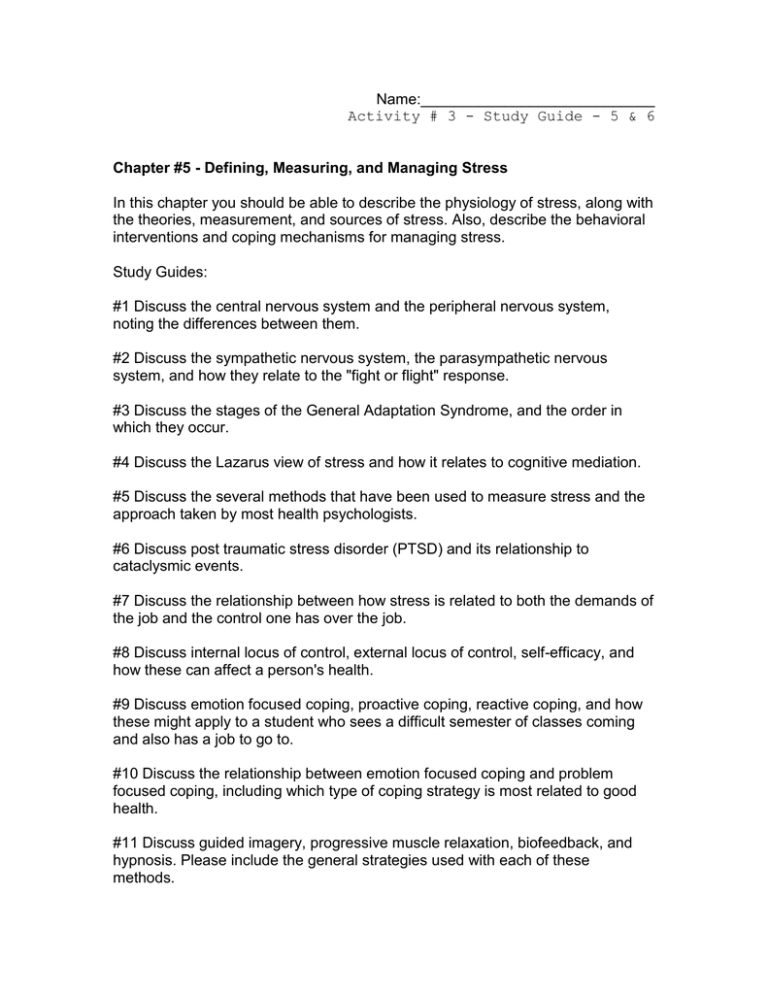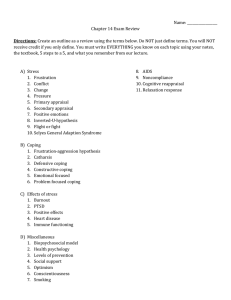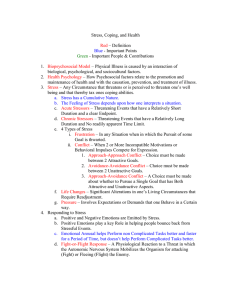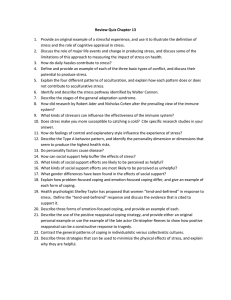Name:____________________________ In this chapter you should be able to describe the... Activity # 3 - Study Guide - 5 & 6
advertisement

Name:____________________________ Activity # 3 - Study Guide - 5 & 6 Chapter #5 - Defining, Measuring, and Managing Stress In this chapter you should be able to describe the physiology of stress, along with the theories, measurement, and sources of stress. Also, describe the behavioral interventions and coping mechanisms for managing stress. Study Guides: #1 Discuss the central nervous system and the peripheral nervous system, noting the differences between them. #2 Discuss the sympathetic nervous system, the parasympathetic nervous system, and how they relate to the "fight or flight" response. #3 Discuss the stages of the General Adaptation Syndrome, and the order in which they occur. #4 Discuss the Lazarus view of stress and how it relates to cognitive mediation. #5 Discuss the several methods that have been used to measure stress and the approach taken by most health psychologists. #6 Discuss post traumatic stress disorder (PTSD) and its relationship to cataclysmic events. #7 Discuss the relationship between how stress is related to both the demands of the job and the control one has over the job. #8 Discuss internal locus of control, external locus of control, self-efficacy, and how these can affect a person's health. #9 Discuss emotion focused coping, proactive coping, reactive coping, and how these might apply to a student who sees a difficult semester of classes coming and also has a job to go to. #10 Discuss the relationship between emotion focused coping and problem focused coping, including which type of coping strategy is most related to good health. #11 Discuss guided imagery, progressive muscle relaxation, biofeedback, and hypnosis. Please include the general strategies used with each of these methods. #12 Discuss cognitive behavioral therapy, its general approach, and its objectives. #13 Discuss Pennebaker's approach to dealing with traumatic events, and whether this has produced positive results. Chapter #6 - Understanding Stress and Disease This chapter should help you understand the physiology of the immune system, and the effect of stress on disease. Study Guides: #1 Discuss the main function of the immune system and how increasing the efficiency of the immune system could actually cause a problem for some diseases. #2 Discuss HIV, what it stands for, what it is, and how it relates to AIDS. #3 Discuss psychoneuroimmunology and the relationship between behavior, the immune system, and your health. #4 Discuss the factors that can decrease the immune system. #5 Discuss how stress may relate to disease because of the activities which people do while under stress. #6 Discuss the relationship between stress and heart attacks, stress and the common cold, and between stress and psychological disorders. #7 Discuss the relationship between a negative outlook and the tendency to ruminate with the risk for depression. #8 Discuss the increased risk for physical and mental troubles arising from a high level of stress on the job and the long-term effects of this. #9 Discuss the posttraumatic stress disorder (PTSD) and its symptoms.



